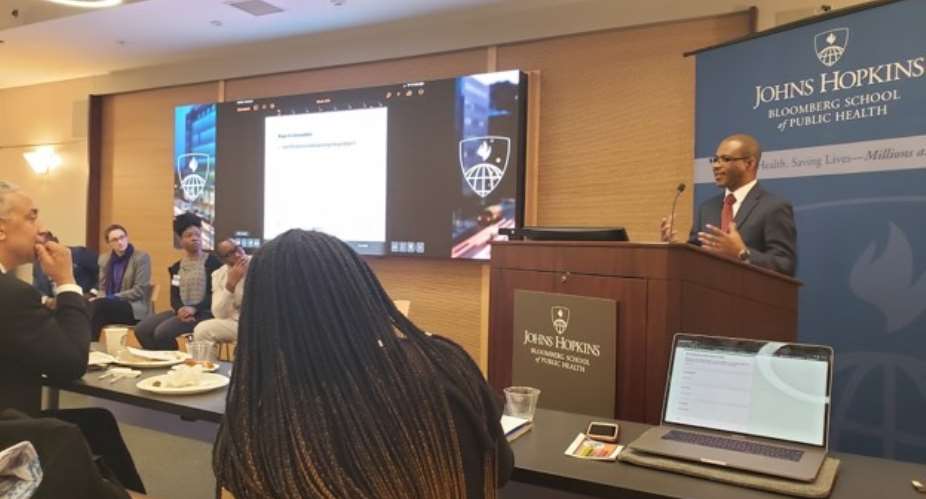WASHINGTON, DC – With the rapid spread of the Coronavirus outbreak in many more countries outside of China and problems with testing kits in the United States, infectious disease expert, Dr. Dougbeh Christopher Nyan , has expressed concerns about the quality of Coronavirus testing kits which were sent to African countries and other developing countries from the US Center for Disease Control and Prevention (CDC).
Speaking with reporters in a recent skype interview, the Liberian scientist, Dr. Nyan, said “as many laboratories in the United States have reported trouble with the Coronavirus test produced by the US Center for Disease Control (CDC), we are very concerned about the accuracy and other diagnostic characteristics of Coronavirus COVID-19 Test-Kits sent to African countries during this outbreak.”
He explained that “African countries using any of these faulty testing kits from the US CDC could be at very high risk of misdetection, and therefore possible spread of the virus in the population if positive cases of Coronavirus (COVID-19) infections are missed.”
According to reports, some test kits presently used in Liberia, for example, were supplied from the US CDC to aid in monitoring the Coronavirus transmission which has already totaled over 80,000 cases worldwide and killed more than 2,500 people. South Korea, Japan, Italy and Iran have reported the highest number of COVID-19 cases outside of China where the outbreak began in November 2019.
The Washington Post and LiveScience recently reported that testing kits sent by the CDC to state laboratories across the United States are unusable due to faulty reagents component that cause the test to return inconclusive results.
In a recent press conference, the US CDC Director of National Center for Immunization and Respiratory Diseases, Dr. Nancy Messonnier confirmed that the CDC test “wasn’t working as expected, specifically some public health labs at states were getting inconclusive results and what that means is that test results were not coming back as false positive or false negatives but they were being read as inconclusive.”
Dr. Nyan, in a communication to medical and public health authorities, expressed concerns about “the possibility of misdiagnosing COVID-19 in Liberia and other African countries if the reported US CDC faulty test kits are the ones being used for monitoring and surveillance.”
He commented that “a missed positive case could begin the rapid spread of coronavirus in a population already living under weak and struggling public health systems which rely heavily on NGO donations.”
Dr. Nyan further stated that “my concern is particularly heightened about any inability of the US CDC test to discriminate other phylogenetically related Coronaviruses such as the Sever Acute Respiratory Syndrome (SARS) and the Middle Eastern Respiratory Syndrome (MERS) which share similar onset clinical symptoms with COVID-19 and caused epidemics in Asia and the Middle East around 2003 and 2015.”
The Nyan Test was at the center of discussion during the recent Mzuzah African Healthcare Innovation and Sustainability Conference held at the Johns Hopkins University Bloomberg School of Public Health where he presented. Dr. Nyan is winner of the 2017 African Innovation Prize for Social Impact and also awarded a Patent by the United States Patent and Trademark Office for his invention of the rapid multiplex pathogens diagnostic test, which can simultaneously detect and identify multiple infections, including Coronaviruses.
Dr. Nyan’s team has offered to help African countries develop a rapid test for Coronaviruses that will function as a parallel or second test for surveillance, validation and evaluating persons under investigation for COVID-19 infection. Already, some hospitals and laboratories in the United States are pushing for developing their in-house tests for COVID-19, while awaiting the US Center for Disease Control to correct the problem with its test.





 Dumsor: Don't rush to demand timetable; the problem may be temporary — Atik Moha...
Dumsor: Don't rush to demand timetable; the problem may be temporary — Atik Moha...
 Space X Starlink’s satellite broadband approved in Ghana — NCA
Space X Starlink’s satellite broadband approved in Ghana — NCA
 2024 election will be decided on the grounds of the economy; choice of running m...
2024 election will be decided on the grounds of the economy; choice of running m...
 Dumsor: We're demanding less; just give us a timetable — Kwesi Pratt to ECG
Dumsor: We're demanding less; just give us a timetable — Kwesi Pratt to ECG
 Do I have to apologise for doing my security work, I won’t – Simon Osei-Mensah r...
Do I have to apologise for doing my security work, I won’t – Simon Osei-Mensah r...
 All my businesses have collapsed under Akufo-Addo — NDC Central regional chair
All my businesses have collapsed under Akufo-Addo — NDC Central regional chair
 Military, Prison Officers clash in Bawku, three injured
Military, Prison Officers clash in Bawku, three injured
 GRA-SML contract: MFWA files RTI request demanding KPMG report
GRA-SML contract: MFWA files RTI request demanding KPMG report
 Court threatens to call second accused to testify if NDC's Ofosu Ampofo fails to...
Court threatens to call second accused to testify if NDC's Ofosu Ampofo fails to...
 Family accuses hospital of medical negligence, extortion in death of 17-year-old...
Family accuses hospital of medical negligence, extortion in death of 17-year-old...
